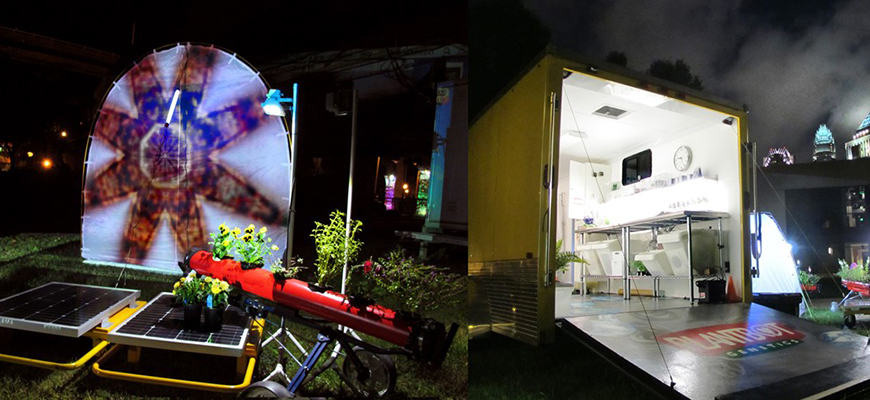
Plant robots mix art and ecology
Interactive exhibit aims to spark conversations about food, environment issues
Posted on: August 17, 2018; Updated on: August 17, 2018
By Annika Dahlgren, mrassist@mailbox.sc.edu
Most art comes alive with expressive colors and vivid designs, but artists Wendy DesChene and Jeff Schmuki bring their art to life with actual plants.
The duo will introduce their exhibit and interactive experience PlantBot 2.0 to the University of South Carolina as part of a collaboration with the College of Arts and Sciences’ School of Visual Art and Design, Sustainable Carolina and the Rhodos Fellows Living and Learning Community.
“The exhibition is meant to start conversations about food issues,” says DesChene. “It is meant to get the audience to look at their surroundings — and their food — in different ways. It makes you wonder what nature will become.”
PlantBot 2.0 is a satirical view of the possible evolution of plant species through modern agricultural practices. In the artwork, genetically modified plants are combined with robotic bases to show the ambiguous future of organisms with no original roots. The plants grow from genetically modified seeds from top biotech companies.
The exhibition opens at McMaster Gallery on Aug. 30 and includes an interactive component at Sustainable Carolina Farm and Gardens behind Green Quad.
There, artists will set up a workshop with insect tents and lights to attract moths as part of a survey and identification project. Participants can learn more about the important role pollinators play in a healthy environment and examine the insects’ beautiful patterns. Visitors are invited to walk through the lab and play with pollinator bots while gaining more information about the exhibit’s purpose.
School of Visual Art and Design director Laura Kissel looks forward to welcoming the university community and the public to the exhibition and its accompanying special events.
“PlantBots, McMaster Gallery’s first exhibition this academic year by artists Wendy DesChene and Jeff Schmuki prompts us to engage in a hands-on way with contemporary issues surrounding bioengineered food crops,” Kissel says. “These artists are asking questions about our shared experience of the natural environment and food technologies, and getting us to wrestle with our values and scientific understanding in creative and thought-provoking ways.”
Working under the guise of PlantBot Genetics, artists DesChene and Schmuki have collaborated with partners across the country to improve ecological literacy and empower communities via art and citizen science. They have been awarded National Education Association and Pulitzer Foundation grants for exhibitions and programming.
“As artists, we are interventionists and engage in tactical media. We create art that engages and critiques the biotech sector and its modern farming practices through parody,” Schmuki says. “Today, we are stepping back in transparency of food production, and that’s kind of dangerous. I’d like to know what I am eating. So we are using humor to start conversations on food transparency and even on pollinator populations, which are declining rapidly.”
When the exhibition wraps up at McMaster Gallery in October, the artists will return to Columbia and lead a session on how to build plant robots. The experience will be open to students and members of the university and Columbia community.
Experiential learning
PlantBot 2.0
Gallery exhibit opening
When: 5 to 7 p.m. Aug. 30 (exhibit runs through Oct. 11)
Where: McMaster Gallery, School of Visual Art and Design
Moth survey and interactive experience
When: 8 p.m. Aug. 30 to midnight Aug. 31
Where: Sustainable Carolina Farm and Gardens behind Green Quad
PlantBot building workshop
When: 5:30 to 7:30 p.m Oct. 11
Where: Makerspace Rhodos Fellows Living and Learning Community